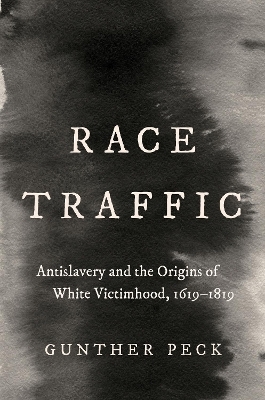
Race Traffic
Antislavery and the Origins of White Victimhood, 1619-1819
Seiten
2024
The University of North Carolina Press (Verlag)
978-1-4696-7514-5 (ISBN)
The University of North Carolina Press (Verlag)
978-1-4696-7514-5 (ISBN)
- Lieferbar (Termin unbekannt)
- Versandkostenfrei
- Auch auf Rechnung
- Artikel merken
Fantasies of white slavery and the narratives of victimhood they spawn form the foundation of racist ideology and obscure the experience of trafficked servants and sailors in the 17th and 18th centuries. Peck moves between the Atlantic and Mediterranean worlds to discover where and when people with light skin color came to see themselves as white.
Fantasies of white slavery and the narratives of victimhood they spawn form the foundation of racist ideology. They also obscure the lived experience of trafficked servants and sailors in the seventeenth and eighteenth centuries. Gunther Peck moves deftly between the Atlantic and Mediterranean worlds to discover where and when people with light skin color came to see themselves as white. Separating fact from fiction, and paying close attention to the ideological work each performs, Peck shows how laboring women and men leveraged their newfound whiteness to secure economic opportunity and political power.
Peck argues that whiteness emerged not as a claim of racial superiority but as a byproduct of wide-ranging and rancorous public debate over trafficking and enslavement. Even as whiteness became a legal category that signaled privilege, trafficking and race remained tightly interwoven. Those advocating for the value of whiteness invoked emotionally freighted victimhood, claiming that so-called white slavery was a crime whose costs far exceeded those associated with the enslavement of African peoples across the Americas. Peck helps us understand the chilling history that produced the racist ideology that still poisons our politics in the present day.
Fantasies of white slavery and the narratives of victimhood they spawn form the foundation of racist ideology. They also obscure the lived experience of trafficked servants and sailors in the seventeenth and eighteenth centuries. Gunther Peck moves deftly between the Atlantic and Mediterranean worlds to discover where and when people with light skin color came to see themselves as white. Separating fact from fiction, and paying close attention to the ideological work each performs, Peck shows how laboring women and men leveraged their newfound whiteness to secure economic opportunity and political power.
Peck argues that whiteness emerged not as a claim of racial superiority but as a byproduct of wide-ranging and rancorous public debate over trafficking and enslavement. Even as whiteness became a legal category that signaled privilege, trafficking and race remained tightly interwoven. Those advocating for the value of whiteness invoked emotionally freighted victimhood, claiming that so-called white slavery was a crime whose costs far exceeded those associated with the enslavement of African peoples across the Americas. Peck helps us understand the chilling history that produced the racist ideology that still poisons our politics in the present day.
Gunther Peck is associate professor of history at Duke University.
| Erscheinungsdatum | 12.10.2024 |
|---|---|
| Reihe/Serie | Published by the Omohundro Institute of Early American History and Culture and the University of North Carolina Press |
| Zusatzinfo | 30 halftones |
| Verlagsort | Chapel Hill |
| Sprache | englisch |
| Maße | 155 x 235 mm |
| Themenwelt | Geisteswissenschaften ► Geschichte ► Regional- / Ländergeschichte |
| Sozialwissenschaften ► Soziologie ► Makrosoziologie | |
| ISBN-10 | 1-4696-7514-5 / 1469675145 |
| ISBN-13 | 978-1-4696-7514-5 / 9781469675145 |
| Zustand | Neuware |
| Haben Sie eine Frage zum Produkt? |
Mehr entdecken
aus dem Bereich
aus dem Bereich
Erinnerungen
Buch | Softcover (2024)
Pantheon (Verlag)
CHF 22,40
Universalgelehrter, Polarreisender, Entdecker
Buch | Hardcover (2024)
mareverlag
CHF 39,20


